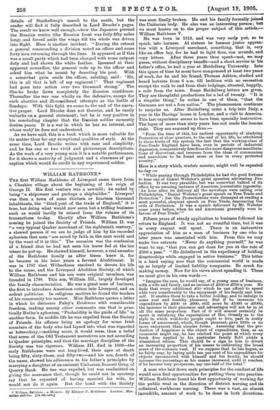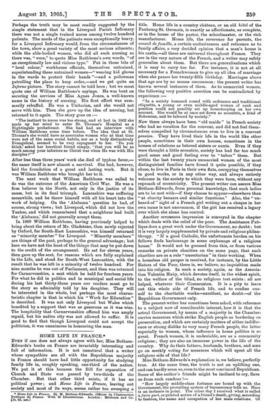THE first William Rathbone of Liverpool came there from a
Cheshire village about the beginning of the reign of George II. His first venture was a sawmill ; he ended by being "a shipowner and perhaps a shipbuilder." Liverpool was then a town of some thirteen or fourteen thousand inhabitants, the "third port of the trade of England," it 18 true, but doing what would now seem but a trifling business, such as would hardly be missed from the volume of its transactions to-day. Shortly after William Rathbone's coming he joined the Society of Friends. William II. was "a very typical Quaker merchant of the eighteenth century," a shrewd person if we are to judge of him by his recorded aphorism that men "are saved by faith in the next world and by the want of it in this." The occasion was the confession of a friend that he had not seen his horse fed at the inn where he put up. He showed himself, however, a real ancestor of the Rathbone family as after times knew it, for he became in his later years a fervent Abolitionist. It was in 1787 that Wilberforce resolved to devote his life to the cause, and the Liverpool Abolition Society, of which William Rathbone and his son were original members, was founded in 1788. This son, William III., largely developed the family characteristics. He was a great man of business, the first to introduce American cotton into Liverpool, and an ardent politician. In religious matters he found the borders of his community too narrow. Miss Rathbone quotes a letter in which be discusses Paley's Evidences with considerable freedom, making among other comments one that is prac- tically Butler's aphorism, "Probability is the guide of life," in another form. In middle life he was expelled from the Society of Friends, his offence being an apology for some Irish members of the body who had lapsed into what was regarded as heterodoxy,—nothing more, it would seem, than a belief that some of the Old Testament narratives are not according to Quaker principles, and that the marriage discipline of the Society was too rigorous. William III. died in 1809—the early Rathbones were not long-lived, their ages at death being fifty, sixty-three, and fifty-two—and his son, fourth of the name, showed his adherence to his father's principles by marrying a daughter of an eminent Unitarian, Samuel Greg, of Quarry Bank. He too was expelled, but was readmitted on giving the assurance that, though he could not in courtesy say that he repented of having married his wife, he would not do it again. But the bond with the Society Rathbone: a Memoir. By Eleanor P. Rathbonc. London: Mac- millan and Co. CAL 64. net.]
was soon finally broken. He and his family formally joined the Unitarian body. He also was an interesting person; but we must hasten on to the proper subject of this article, William Rath bone V.
He was born in 1819, and was very earl,'" put, so to speak, into harness. At sixteen he became junior appren- tice with a Liverpool merchant, something, that is, very like an office boy, for he had to light fires, run errands, and copy letters. After three years thus spent—not, we may guess, without disciplinary benefit—and a short service in his father's office, he had a year at Heidelberg University. Into this space of time he must have compressed at least two years of work, for he and his friend, Thomas Ashton, studied and heard lectures from 6 a.m. till bedtime with no recreation except the walk to and from their lodgings, situated, happily, a mile from the town. Some Heidelberg letters are given. They are thoughtful productions for a lad of twenty. "It is a singular thing," he writes in one of them, "that the Germans are not a free nation." The phenomenon continues to surprise us. After Heidelberg came a trip into Italy, a year in the Barings' house in London, and a visit to America. This last experience seems to have been specially instructive. The lapse of more than sixty years has not made the lessons stale. They are summed up thus :—
"From the time of this, his earliest opportunity of studying Protection at close quarters, to the end of his life, he attributed to these fruits of the system the fact that the working-class of Free-Trade England have been, even in periods of industrial depression, comparatively free from the more dangerous manifesta- tions of discontent, and immune from the ideas of communism and anarchism to be found more or less in every protected country."
Here is a story which, mutato nomine, might well be repeated
" While passing through Philadelphia he had the good fortune to hear one of Daniel Webster's great speeches advocating Pro- tection. It was very plausible, but was somewhat balked of its effect by an amusing instance of American journalistic ingenuity. An hour after its delivery all the newsboys were calling over Philadelphia, "Daniel Webster's great speech on Free Trade and Protection" ; but the Protectionists were dismayed at reading a most powerful, eloquent speech on Free Trade, denouncing the evils of Protection. It was a speech delivered by Mr. Webster some years before, when he and Americans generally were in favour of Free Trade.'"
Fifteen years of steady application to business followed his return to England. It was not an eventful time, but it was in every respect well spent. There is an instructive appreciation of him as a man of business by one who in later years was associated with him. From this we may make two extracts. "Never do anything yourself," he was wont to say, "that you can get done for you at the rate of
2500 a year." "He disbelieved in the expediency of holding directorships while engaged in active business." This latter is a hard saying now that the commercial world is made up so largely of limited liability companies. So much for
making money. Now for his views about spending it. These we must give in his own words
"Imagine the case, he would say, of a young man of business, with a wife and family, and an income of £500 or ZOO a year. He finds that every additional £10 which he can afford to spend adds very considerably to the enjoyment of his family and him- self. It enables them to take a better holiday, and to indulge in some real and healthy pleasures. But if he increases his expenditure by £500 or £600, still more by £1000 or £2000, the increase in their pleasures and advantages will not be in at all the same proportion. Part of it will almost certainly be spent in satisfying the expectations of Mrs. Grundy as to the style in which well-to-do people ought to live, part in costly forms of amusement, which, though pleasant, gave little or no more enjoyment than simpler forms. Assuming that the pro- duction of happiness is the object of expenditure, then, as an economist might say, he has reached the point at which every fresh dose applied to his particular family field yields a diminished return. This should be a sign to him to divert an increasing proportion of his means to cultivating the broad acres of the common weal. If we suppose that he has begun, as he fairly may, by laying aside ten per cent of his expenditure for objects unconnected with himself and his family, he should increase the percentage as his means increased, until it reaches, if he become very prosperous, say one-half of the total."
A man who laid down such principles for the conduct of life would soon find opportunities for putting them into practice. William Rathbone found his first opportunity of working for the public weal in the direction of district nursing and its collateral, workhouse nursing. There was a vast, an almost incredible, amount of work to be done in both directions. simple statement that in the Liverpool Parish Infirmary there was not a single trained nurse among twelve hundred patients. The needs of the patients were exceptionally heavy, for a Liverpool Infirmary would, from the circumstances of the town, show a great variety of the most serious ailments; while the able-bodied women, who did all such nursing as there was, "were," to quote Miss Rathbone's own words, "of an exceptionally low and vicious type." Put in these bits of "local colour," workhouse officials, themselves untrained, superintending these untrained women—" wearing kid gloves in the wards to protect their hands "—and a policeman patrolling the place to keep order,—and we get quite an Inferno picture. The story cannot be told here ; but we must quote one of William Rathbone's sayings. He was bent on securing the services of Miss Agnes Jones, a well-known name in the history of nursing. His first effort was sum- marily rebuffed. He was a Unitarian, and she would not serve with him. Then she gave up the idea of nursing, but returned to it again. The story goes on :—
" The instinct to nurse was too strong, and at last in 1862 she made up her mind to enter St. Thomas's Hospital as a Nightingale probationer. She had had an interview with William Rathbone some time before. The idea that at St. Thomas's she would have as associates women who at that time were not of the same social habits, nor as a body distinctively Evangelical, seemed to be very repugnant to her. Do you think,' asked her heretical friend simply, that you will be as much among your inferiors as Christ was when He was with His disciples r " After less than three years' work she died of typhus fever ,— the name itself is now almost a survival. She had, however, laid the foundation of a great and lasting work. But it was William Rathbone who brought her to it.
The next work that William Rathbone was called to do was the outcome of the American Civil War. He was a firm believer in the North, not only in the justice of its cause, but in its final triumph. Lancashire was suffering meanwhile, and he threw himself with all his heart into the work of helping. On the 'Alabama' question he had, of course, strong views ; but Liverpool, which did not love the Yankee, and which remembered that a neighbour had built the Alabama,' did not generally accept them.
In 1869 William Rathbone, having previously helped to bring about the return of Mr. Gladstone, then newly rejected by Oxford, for South-East Lancashire, was himself returned as "minority member" for Liverpool. "Minority members" are things of the past, perhaps to the general advantage; but here we have not the least of the things that may be put down to the credit of the arrangement. He sat for eleven years, then gave up the seat, for reasons which are fully explained in the Life, and stood for South-West Lancashire, with the result that he was left in a minority of twelve hundred. For nine months he was out of Parliament, and then was returned for Carnarvonshire, a seat which he held for fourteen years. For what he did in politics and in municipal and social-life during his last thirty-three years our readers must go to the story so admirably told by his daughter. They will be interested in the whole, but perhaps the most charac- teristic chapter is that in which his "Work for Education" is described. It was not only Liverpool but Wales which benefited by a support that was as generous as it was wise. The hospitality that Carnarvonshire offered him was amply repaid, but his native city was not allowed to suffer. It is good to find that though Liverpool could not accept the politician, it was unanimous in honouring the man.
HOME LIFE IN FRANCE.*



































 Previous page
Previous page